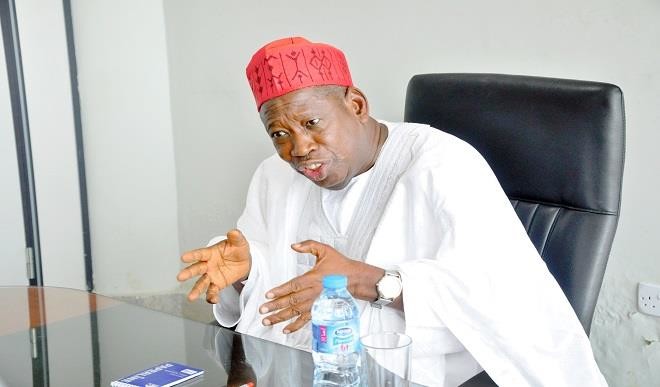- Kano Will Lose Status Without Igbo, Others
The Kano State Governor, Dr. Abdullahi Ganduje, on Wednesday said Kano would not have risen to become a commercial nerve centre to reckon with without the presence of the Igbo and other ethnic nationalities.
He also blamed the elite for the ongoing agitations by some sections of the country to secede.
Ganduje made the comments when the Abia State Governor, Dr. Okezie Ikpeazu, visited him over the death of Danmasanin Kano, Alhaji Maitama Sule.
On the elite, he said, “Sometimes, you can have knowledge without wisdom; that is the basis of what is happening to our present elite. That is why we have these ethnic agitations. It has no wisdom.
“Your coming to Kano to console us tells a lot across the divide. It speaks much about the national integration we are trying to achieve.”
He said that knowledge without wisdom was the cause of the present agitation, stressing that most Nigerians involved in the agitation had knowledge but lacked wisdom.
Ganduje said, “It pains us that some people are calling for separation. When the ejection order or migration order was given, we in Kano said no; that nobody was going anywhere. Here in Kano, we discussed with our youths and we discussed with the people and we discussed with those, who are being referred to as non-indigenes.
“We have abolished that boundary in Kano as everybody residing in Kano is an indigene of Kano State. You can only say that you are an indigene of Kano with primordial claims elsewhere. But as far as we are concerned, you and your children are indigenes of the state.”
He said Kano’s accommodating nature was historical.
“Kano being the commercial nerve-centre of the North, Kano being the commercial nerve-centre of some West African countries, could not have attained that status without other nationalities or without other parts of the country, especially the Igbo. So, if that is our pride, why do we have to break our backbone of commerce?
“We need to maintain our status. And to maintain our status, we need people from all over the country to be with us. America is great because people from different cultures, people with different comparative advantages were put together; everybody came with his talent, with his own initiation, with his own wisdom. That is what made America to be great. You can hardly be great with homogeneity; heterogeneity is the way to development all over the world,” he argued.
In his remarks, Ikpeazu said the unity of Nigeria was not questionable.
He said, “My position is that the unity of Nigeria is not questionable. ‘I spent the entire seven years at the University of Maiduguri from age 16 and I took my Masters degree from there. I have also worked in Lagos in the West. I have seen the entire states in Nigeria and I have seen the rainbow that beautifies the country.
“I have seen the importance of unity in diversity and all I can say is that the only thing we need in Nigeria is to go by the paradigm or by the idiom that says that if you have a dirty hair, you don’t cut it off, you wash it. If there are issues to discuss, let us sit down to talk about them. I do not think that to break the egg would give us the end we desire.”

 Naira3 weeks ago
Naira3 weeks ago
 News4 weeks ago
News4 weeks ago
 Naira4 weeks ago
Naira4 weeks ago
 Jobs3 weeks ago
Jobs3 weeks ago
 Naira3 weeks ago
Naira3 weeks ago
 Travel3 weeks ago
Travel3 weeks ago
 Naira3 weeks ago
Naira3 weeks ago
 Investment4 weeks ago
Investment4 weeks ago






























